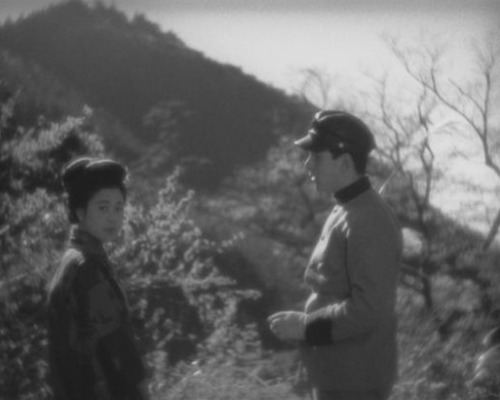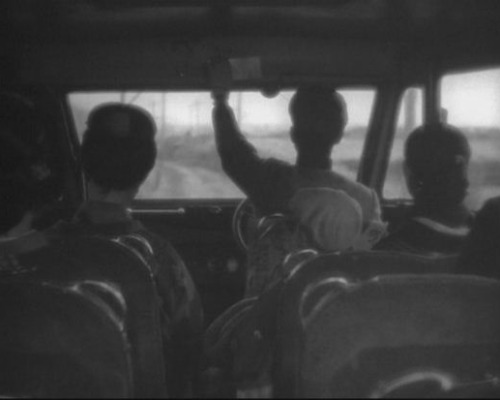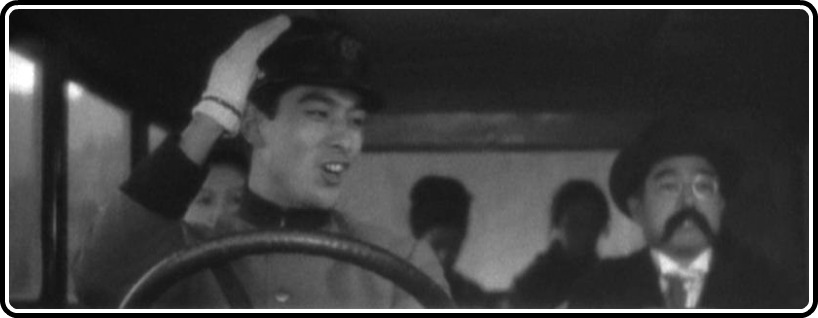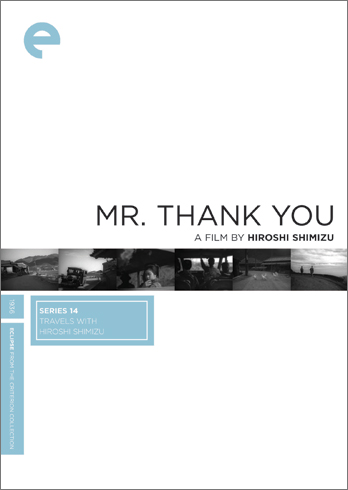Though I won’t assume anyone took special notice of the fact, I took last Monday off from writing a new installment in this weekly column of Eclipse film reviews. Reason being that I took my family on a ten-day vacation to California, specifically San Francisco and the north coast of that state up toward Mendocino. So since I’m just back from a nice long stretch of traveling, it seems like a road movie is in order, and I found just the right offering, Mr. Thank You, from Eclipse Series 15: Travels With Hiroshi Shimizu. Through no fault of his own, this set of Depression-era films from the little-known director Shimizu is probably one of the most obscure sets featured so far in the entire run of Eclipse boxes, but he’s a perfect example for what makes this line of DVDs so engaging and essential (hey, he even directed a film titled Eclipse, though it’s not included here!).
Up until its release last year, I don’t think any of Shimizu’s films had been released on DVD, at least in Region 1, and as is the case with early Ozu, much of Shimizu’s output is forever lost to the ravages of time and poor preservation methods. But what we do have provides a unique and often delightful glimpse into the life and sensibility of prewar Japan. Mr. Thank You represents my first exposure to Hiroshi Shimizu, but its brevity and the congenial atmosphere he created in it certainly invites further exploration, sooner rather than later.
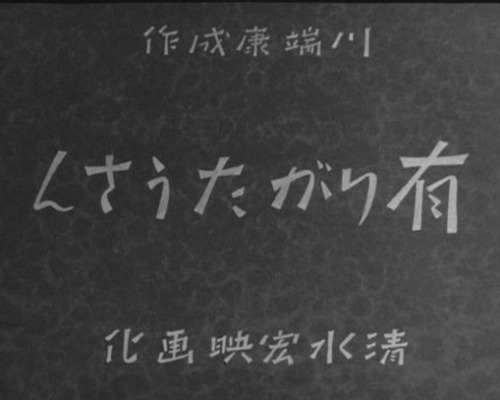
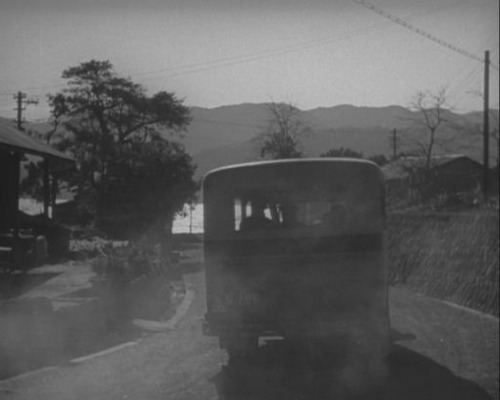
What distinguishes Shimizu’s films from the works of Yasujiro Ozu and Kenji Mizoguchi, who were also making films around this time and featured elsewhere in the Eclipse Series, was his spontaneous quality of just packing up the camera, hitting the road and filming what he found there. That free-wheeling curiosity is most clearly on display in Mr. Thank You, the filming of which began without a definitive shooting script, even though it was based on a popular short story involving a group of characters traveling together on a bus from the country to the city. Shimizu and his crew set out with a few ideas in mind, a basic sense of how the tale would progress, but also an openness to incorporating whatever random elements they encountered as they made their way up the southeastern coastline of Japan from the rustic peninsula and villages of Izu to the bustling metropolis of Tokyo.
Though the distance covered isn’t all that far, it represents a full afternoon and evening’s ride, owing to the twisty gravel roads that the bus must traverse, and the frequent stops it has to make along the way. The scenes were in many ways highly reminiscent of the winding path I drove last week as I ushered my family up and down the coastal Highway 1 between Fort Bragg and San Francisco, though my road was paved and the film’s jaunty 1930s soundtrack was replaced with a selection of classic 1960s tracks from Rhino Records Nuggets anthologies (just in case you’re interested in such personal details.) This ambling, gradual pace allows the passengers brief but adequate opportunities to interact and get to know each other, with entertaining results.
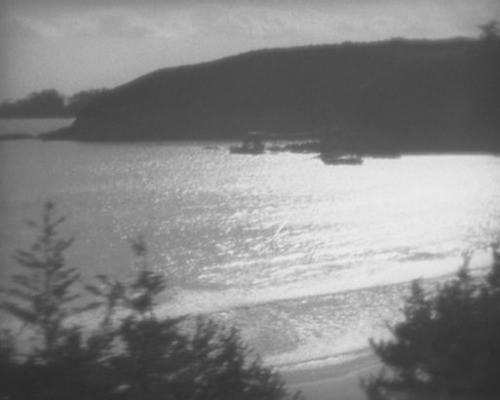
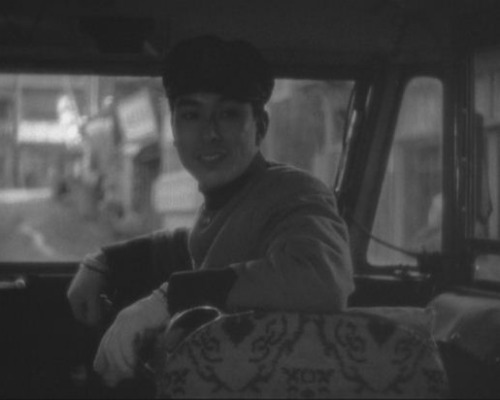
At the center of the action is a young and impeccably courteous driver, Mr. Thank You (Arigato-san, in Japanese) who’s earned his nickname by calling out his gratitude every time a pedestrian has to step aside to make way for his bus. As we learn in the viewing, roads seemed a lot more like sidewalks than highways in rural Japan back in those days. Most of the walkers are peasants of one sort or another, usually carrying big heavy loads on their backs, often whole families or crews of works making their slow plodding progress to a destination miles away.
Shimizu uses an intriguing camera trick quite frequently where we see their backs in a point of view shot from the driver’s perspective, which immediately dissolves to another P.O.V. as the bus pulls away in front of them and we see them as they appear through the back window. The effect is to give the peasants and/or the bus an ephemeral ghostliness, as if we’ve just passed directly through (not around) them, given just a moment to regard them as individuals and wonder just what events have transpired to put them on the road at this time in their life, before we cast our vision forward again to see what surprises lurk around the next curve in the road.
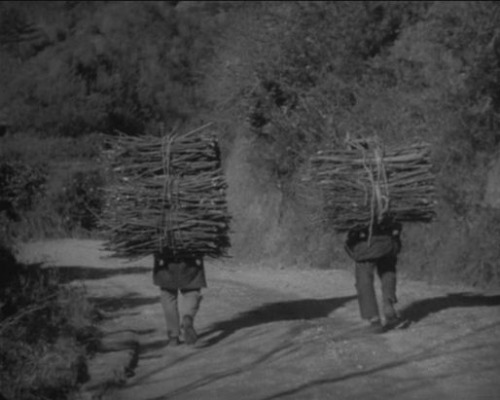
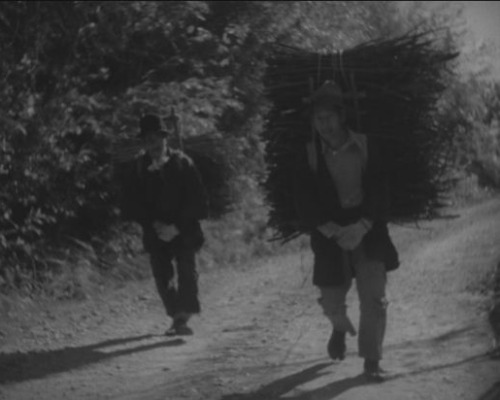
So we get to enjoy a lot of interesting scenery of the Japanese landscape, which gives Mr. Thank You a quasi-documentary feel. It’s not really a travelogue, because no narrator explains to us what it is we’re seeing, but I imagine for many of the film’s original viewers, it was a valuable opportunity to get a look at what life was like in other parts of the country, or a remarkable occasion to see their own small towns and villages captured on the big screen, rather than the usual shots of movie sets based on big-city glamor and sophistication.
I pick up a tangible sense of Shimizu’s deep delight in capturing these images. For modern audiences, it’s a priceless record of a long-gone era, and I totally enjoyed the chance to see some great location shots of some of the last flickering remnants of ‘old Japan.’
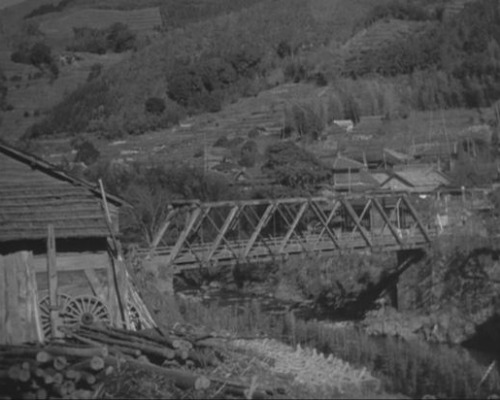
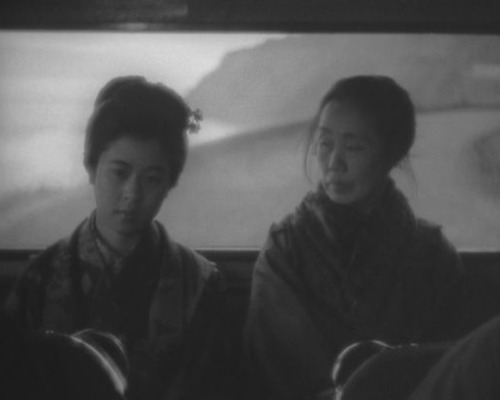
But even more important than what we see happening outside the bus is the small-scale but poignant human drama that takes place within its confines. (If the bus hadn’t driven all over the place, it might have made a good variation on a theme from the most recent episode of CriterionCast, ‘single location films.’) We never learn any of the characters’ names, but we discover certain things about them that stir up feelings of amusement, pathos and admiration. The central narrative involves a mother and daughter who get on at the start of the trip intent on riding the bus to the end of the line in Tokyo. The purpose of their journey is to put the daughter to work so that she can financially support their struggling household.
Though it’s not explicitly stated, the implication is that the attractive 17-year old will be sold off to work in a brothel not that much different than what we saw in Mizoguchi’s Street of Shame a few weeks back. The daughter is clearly torn by humiliation over the dilemma, despite her mother’s best attempts to soften the impact of this life-changing event. Of course the sight of a pretty young woman on a bus usually frequented by male laborers and businessmen stirs up some interest, so the pair also have to deal with nosy questions put forth by their fellow passengers. Numerous incidental comments serve to twist emotional knives in the heart of the young woman as she realizes that each mile the bus travels brings her closer to a miserable fate that family duty compels her to accept.
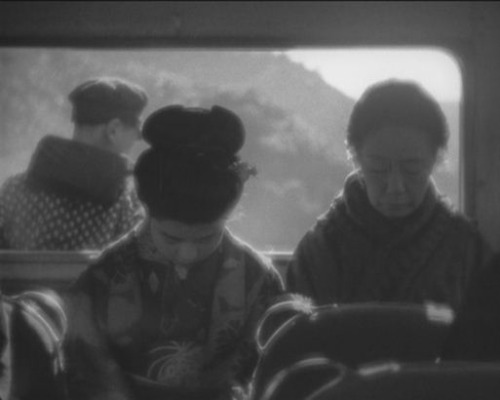
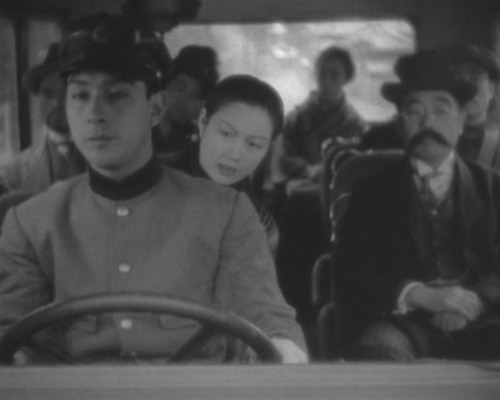
In contrast to the mother and daughter, both garbed in traditional feminine attire, a modernistic young woman sits at the front of the bus, offering her brash and unsparing commentary to any and all. She definitely gives the impression of someone who’s been around the block a few times, and who’s made this trip to the big city and back more frequently than some would consider respectable. Her barbed repartee with a pompous salesman nicknamed Mr. Moustache provides a big dose of comic relief as well as some piercing insight on the changes that were already underway in Japanese society as Western influences and a general willingness to call old ways into question began settling in among the younger population.
Of course, the reactionary imperialist government that drove Japan into an expansionist war tried its hardest to counteract these attitudes, but their triumph was only temporary and led to so much senseless destruction. Still, it’s easy for me to see how some of Mr. Thank You‘s original audience must have been shocked by her brassy demeanor, blowing smoke rings in the face of her fellow passengers and passing around a bottle of booze to pass the time just after more conventional sweet treats had been shared by the mother and daughter.
Beyond the sometimes exotic, often mundane scenery and the in-transit intrigues, Mr. Thank You also captures moments of larger cultural tension as characters make offhand remarks about the difficult economic conditions that cause families and whole villages to fall into poverty with no clear hope of relief in sight. There’s a running duel with a group traveling in a flashy convertible where the bus and car take turns passing each other (the car has frequent breakdowns along the way) representing a clash of the haves and have-nots.
The introduction of the English word (and Western concept) of ‘hiking’ prompts a few laughs but also signifies some tensions as the ordinary transportation methods of the working class are now being seen as a luxurious pastime of the privileged class. (I found it interesting to think of how hiking also played a role in the social pastimes of Ozu’s Early Spring.)
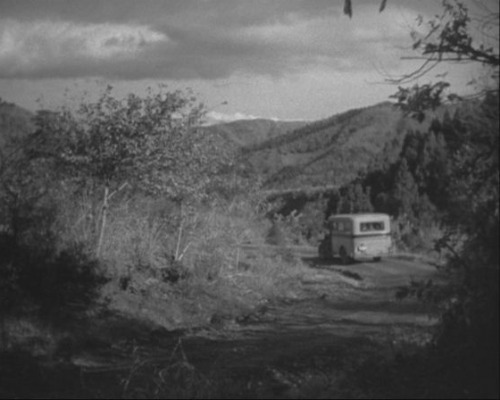
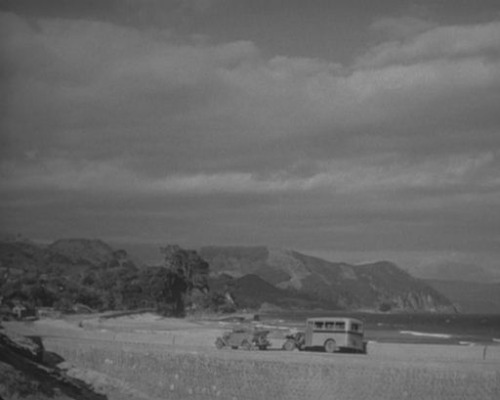
At the heart of the picture though sits the guy who literally drives this bus, Mr. Thank You, something of an enigma but a fine role model nevertheless for anyone struggling with road rage or simple empathy for his or her fellow human being. Far from seeing his role behind the wheel as ‘just a job,’ Mr. Thank You understands that he plays a vital role in connecting people in remote locations with each other.
We live in a much more technologically advanced era, rendering obsolete many of the measures that Mr. Thank You takes in order to assist his passengers – but the example he sets of the positive effects of simple human warmth and kindness is one that I hope still speaks to us today, and never goes out of style.
